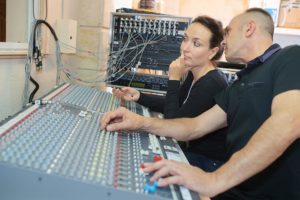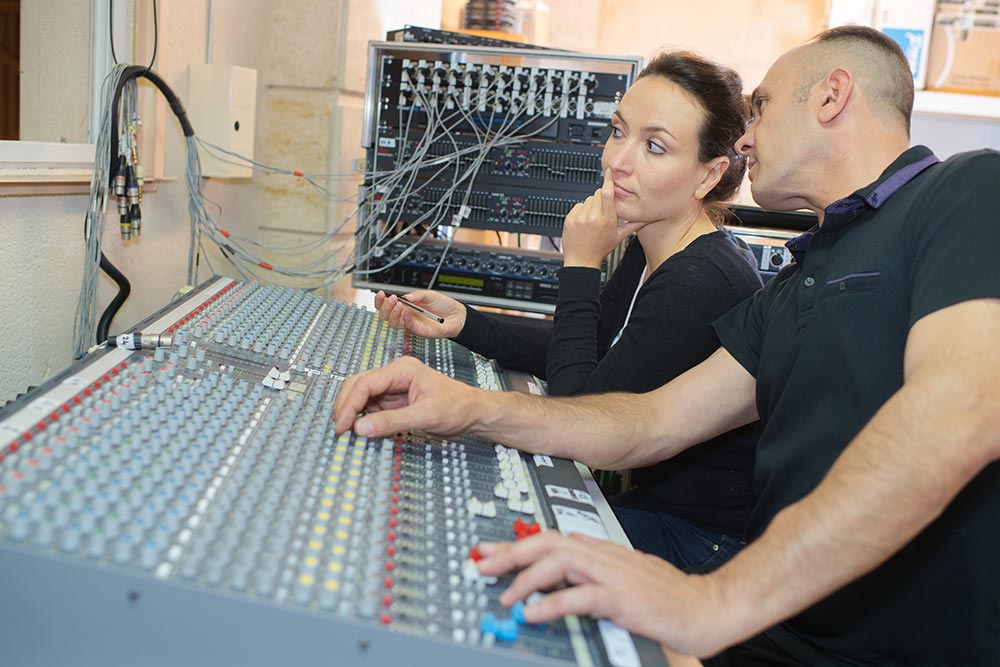Disclaimer: The information on our website is provided for general information purposes only. We make no representations or warranties of any kind, express or implied, about the completeness, accuracy, reliability, suitability or availability with respect to the website or the information contained on our website for any purpose. Any reliance on such information is therefore strictly at your own risk and we are not liable for any damages or losses arising out of or resulting from your reliance on any information contained on our website.
A media and communication equipment worker installs, maintains, and repairs audio and visual systems. These professionals are needed in various industries such as the movie and film industry, corporate offices (assisting a company’s internal communications). Some media and communication workers even transition to a sales position for companies selling media equipment.
How to Become a Media and Communication Worker

Though you only need a high school diploma to step into this career, previous experience is preferred. However, if you have a certification or associate’s degree in a field such as telecommunications, that can also help. Those with electrical or computer installation and repair backgrounds can also transition into this career field once they learn how video and audio equipment works.
Without a degree or certification, you may want to seek an internship or entry-level position to learn on-the-job. These positions may not pay much, but after learning the trade, you could be on your way to becoming a media and communication worker. This position has higher growth rates per location, so you’ll want to check if your area has career opportunities.
Benefits of a Media and Communication Worker
Congratulations, you have taken a positive step toward your future by reviewing what a Media and Communication Equipment Worker does and how to become one! Next, let’s review some of the benefits of this career. Media and Communication Equipment Workers benefit from a job that has the opportunity to advance into other technical fields with continued education and experience. If you enjoy a fast-paced environment, the job never gets dull as technology is always changing. That brings us to another benefit, those in this profession get to work with the latest technology and equipment. If you are a people person, Media and Communication Equipment Workers often get to work with a team of people and meet new customers. Though pay may be competitive, salary is also dependent on location.
Job Description of a Media and Communication Worker
Media and communication workers have a variety of duties they perform. They set up or install media equipment such as monitors, cameras, video screens, sound systems, or lighting. This can be for different events, organizations, business buildings, or even news conferences. In addition, media and communication workers may repair, diagnose, and resolve concerns with equipment problems. Others may operate equipment during live sessions by switching camera angles, edit or digitize video, or even mix sound inputs.
Media and communication must have good communication skills. They may coordinate with vendors to obtain equipment, keep inventory and ensure proper storage of all media and communications equipment. Media and Communication Equipment Workers may show their customers how to use the equipment they installed. For example, they might install video and audio conference rooms for a company and then train employees on using the installed equipment. They are also responsible for maintaining equipment, and when it becomes outdated, they may recommend a replacement. Along with troubleshooting any issues that arise for customers, these workers can also handle minor repairs on equipment, preventing customers from replacing what they purchased.
Media and communication workers usually work at the location of their clients. They work a variety of hours to meet their clients’ needs. They are often required to perform physical activities such as lifting, climbing ladders, or kneeling/crawling when setting up media equipment. Some media and communication works sit at a desk if they are not operating equipment or fixing equipment. Other related career fields are: broadcast technician, computer support specialist, satellite systems technician, or even a software quality assurance engineer. You may also want to explore the multimedia, engineering, or communication career pages as well.

